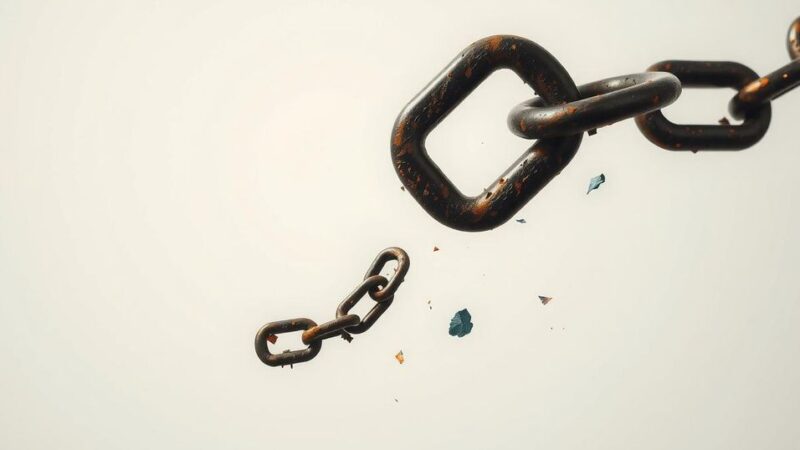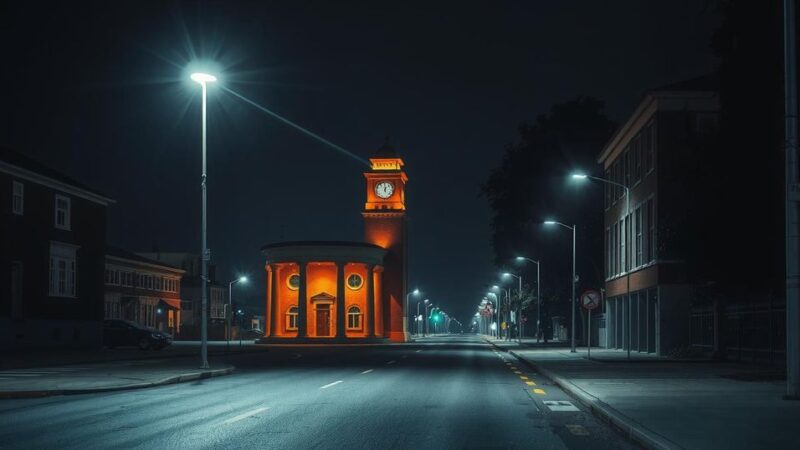A curfew has been enacted in South Sudan after violent attacks on Sudanese nationals resulted in three deaths and multiple injuries. The move aims to quell tensions and protect Sudanese businesses following an outpouring of anger over recent atrocities reported in Sudan. Amid the humanitarian crisis, police continue efforts to maintain order in affected areas while addressing the influx of Sudanese refugees into South Sudan.
A curfew has been imposed in South Sudan following a series of violent revenge attacks on Sudanese nationals and businesses. Police reported that three individuals have died and seven more were injured during clashes with security forces in Juba and Aweil. Sudanese-owned houses were set ablaze in Aweil, prompting authorities to restrict movement in an effort to safeguard property and maintain order.
The nightly curfew prohibits individuals from being outdoors between 6 PM and 6 AM, as stated by Police Inspector General Abraham Manyuat Peter. Authorities reported that 45 Sudanese merchants are being protected at a police station in Juba after being rescued from potential harm. The conflict has intensified as the ongoing civil war in Sudan has led to a significant influx of Sudanese refugees into South Sudan, which separated from Sudan in 2011.
Since the outbreak of violence in April 2023, Sudan has emerged as a critical humanitarian crisis, with about 25 million people requiring urgent food and assistance. Recently released footage purportedly shows Sudanese soldiers committing atrocities against South Sudanese civilians, which has incited anger and calls for retaliation among South Sudanese citizens.
The attacks on Sudanese businesses began as a response to these shocking videos, leading to widespread unrest as hundreds of young men targeted Sudanese-owned establishments. Security forces reported gunfire and heightened tensions during the unrest, especially in Juba’s busy neighborhoods. Many businesses, including the largest market Konyo Konyo, remained closed on Friday due to security concerns.
Bread prices surged by 17% as the few remaining bakeries opened under protective measures. Police have deployed in large numbers to safeguard Sudanese individuals and their properties, while they continue to pursue aggressors across various neighborhoods. Eyewitnesses in Wau indicated significant unrest as well, as overwhelmed authorities struggled to contain the violence.
While spontaneous protests occurred in other locations, the situation remains fluid and difficult to independently verify in areas outside Juba. The conflicting dynamics between Sudanese and South Sudanese individuals highlight the complex relationships stemming from historical racial and ethnic tensions.
The recent violence in South Sudan arises amid escalating tensions following a disastrous humanitarian crisis in Sudan. A civil war that erupted in April 2023 has forced numerous Sudanese to flee into South Sudan, where lingering ethnic and racial animosities continue to simmer. The historic divide dating back to South Sudan’s independence in 2011 fuels ongoing resentment, particularly against lighter-skinned populations in Sudan. The perpetuation of these injustices breeds violence, compelling South Sudanese individuals to retaliate against perceived oppressors, further complicating an already volatile situation.
In conclusion, the imposition of a curfew in South Sudan reflects a societal breakdown amid rising ethnic tensions and retaliatory violence against Sudanese nationals. With increasing fatalities and injuries amidst clashes, authorities are on high alert to mitigate further attacks while addressing the influx of refugees. The humanitarian implications are profound, as both nations continue to grapple with the devastating consequences of historical animosities. The need for dialogue and resolution remains paramount for the stability of both peoples moving forward.
Original Source: www.bbc.co.uk







